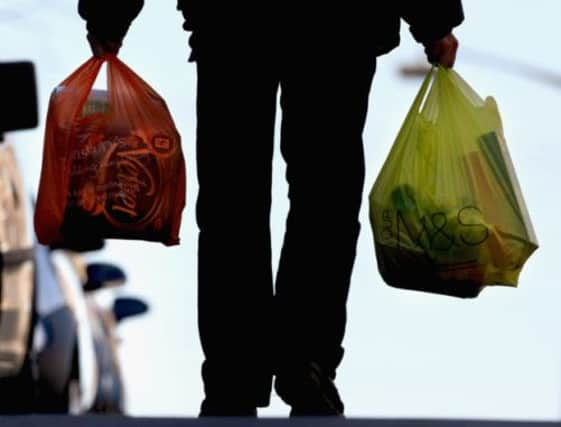Plastic bags tax: Ministers ‘dragging their feet’


Ministers launched a consultation a year ago on proposals to charge shoppers 5p per carrier bag to encourage people to cut down on plastic waste that can harm wildlife.
But although the public part of the consultation closed after three months, the SNP has yet to publish the findings or announce a decision on whether Scotland will follow Wales and Northern Ireland in introducing the levy.
Advertisement
Hide AdAdvertisement
Hide AdYesterday environmentalists expressed concern that ministers could be planning to abandon the scheme.
Dr Richard Dixon, director of Friends of the Earth Scotland, said: “It would be very alarming if we don’t do it. More than a decade ago we had the opportunity to be a leader [in tackling plastic litter] by introducing the levy. Then we had the chance to be one of the first to bring it in. Now we are following everyone else.”
Alison Johnstone, the Green MSP for Lothian, accused the Scottish Government of being weak and warned that urgent action was needed to combat the mounting environmental and economic costs of excess plastic waste.
“The bag charge would have been a bold idea ten years ago but now the Scottish Government should just be embarrassed at their foot-dragging on this simple measure, which is already working well in Wales, Ireland and dozens of other countries,” she said.
Johnstone, who has previously called for carrier bags to be banned in the Scottish capital, added: “While we are dilly-dallying here deciding whether we can follow progressive countries which already have a tax on bags to address the problems, other countries have banned plastic bags outright because they understand the damage they are doing to wildlife and watercourses.
“This damage has an environmental cost which is being borne by council taxpayers [who foot the bill for dealing with plastic waste].”
Although business groups, including CBI Scotland, had expressed fears that the levy could deter firms from investing north of the Border, Johnstone said many smaller companies would be “happy” not to have to fund free carriers and to benefit from business opportunities in producing reuseable bags.
Dixon said a levy on plastic bags would have a significant impact on consumers’ behaviour. “Plastic bags are not the biggest waste problem but they are symbolically important because everyone comes across them every day,” he said.
Advertisement
Hide AdAdvertisement
Hide Ad“In material terms charging for them won’t save the planet, but in cultural terms it is really important and in other countries it is already raising money for charity.
“The current Scottish Government and previous administrations have had good ambitions on zero waste but other countries are now well ahead of us. I’d like to see the zero-waste language being matched by action.”
Last year the Scottish Government announced a national litter strategy to find new ways of dealing with waste.
Environmental charity Keep Scotland Beautiful also launched a drive to recruit a million people across Scotland for a mass anti-litter campaign to clear away “unacceptable” waste after a national “spring clean” collected 1,100 tonnes of litter in two months – enough to fill almost 100,000 wheelie bins.
Around 80 per cent of marine litter comes from the land, including rubbish dropped in streets which is washed into storm water drainage systems.
Recent Scottish research by experts at the University Marine Biological Station found that wildlife in the Clyde was “riddled” with microplastic pollution from carriers and other sources.
Dr Phillip Cowie, who conducted the research, said: “The plastic bag or container that you drop in the street, or which is deposited as landfill, can end up on the beach that you go to spend your recreational time on.
“Plastic bags are not the only source of environmentally damaging litter [and] it may be politically extremely difficult during an economic downturn to impose what may be perceived as an extra cost on shopping – but there comes a point when politicians have to stop prevaricating and take bold decisions for the benefit of our environment and future generations.”
Advertisement
Hide AdAdvertisement
Hide AdIn Wales, research has shown that carrier bag use dropped by between 60 per cent and 80 per cent in supermarkets after a levy was introduced there in 2011.
The UK government, which is also under growing pressure to introduce a tax, has said it is waiting for the results of the SNP’s consultation.
Several supermarkets have already introduced plastic bag charges of their own.
A spokeswoman for the Scottish Government said: “We have carried out the consultation to find out what people’s views are and we are analysing responses in order to reach a decision on the way forward.”
She said there was no date yet for publication of the consultation results.
Twitter: @ScotsmanJulia